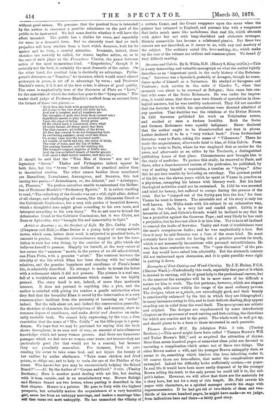Servetus and Calvin. By R. Willis, M.D. (Henry S. King
and Co.)—This is a very interesting and valuable monograph on what the author rightly describes as an "important epoch in the early history of the Reforma- tion." Servotus was a Spaniard, probably of Aragon, though he some- times spoke of himself as a Navarreso. He studied at Saragossa and Toulouse ; took service in the suite of Charles V., when that monarch was about to be crowned at Bologna ; then came into con- tact with some of the Swiss Reformers. He was under the impres- sion, it would seem, that these men were friends of speculation in theo- logical matters, but he was terribly undeceived. They did not consider that the doctrine to which his speculations were directed admitted of any question. That doctrine was the relations of the Divine Nature. In 1531 Servetus published his work on Trinitarian errors, and excited at once a furious hostility. Both the Swiss and German Reformers were equally indignant. &car declared that the author ought to be disembowelled and torn in pieces. Luther declared it to be a " very wicked book." From Switzerland Servetus went to Paris, taking the name of " Villeneuve." There' he made the acquaintance, afterwards fatal to him, of John Calvin. From Lyons he went to Paris, where he was employed first as reader for the press, and afterwards as an editor by the Trechsels, a distinguished publishing house of that place. Circumstances now brought him to the study of medicine. To pursue this study, he removed to Paris, and there, after a time-honoured custom of the profession, he published, by way of making himself a reputation, a treatise on "Syrups." After this ho got into trouble by lecturing on astrology. The quietest period of his life was the eleven years which he spent at Vienne in practice as a physician, occupying his leisure with literary work. But his fatal theological activities could not be restrained. In 1553 he was arrested and tried for heresy, but suffered to escape during the process of the trial. But he "jumped out of the frying-pan into the fire," for from Vienne he went to Geneva. The miserable end of his story is only too well known. Dr. Willis deals with his subject in an exhaustive way, and on the whole, in a very fair and candid spirit. Calvin is no favourite of his, and Calvin's friends wiiuld be inclined to say that he has a prejudice against the Genevan Pope ; and very likely he has snob a prejudice, but he does not allow it to bias him. Nor is heat all inclined to conceal the faults of Servetus. Vanity and want of truthfulness were the man's conspicuous faults ; and he was emphatically a bore. But then it may be said Socrates was a bore of the same kind. He must certainly have the credit for having felt a genuine passion for truth, which is not necessarily inconsistent with personal untruthfulness. He was born three centuries too soon. The " open discussion " of the pre- sent day would have suited him admirably. But the sixteenth century did not understand open discussion, and it is quite possible were right in putting it down.


































 Previous page
Previous page